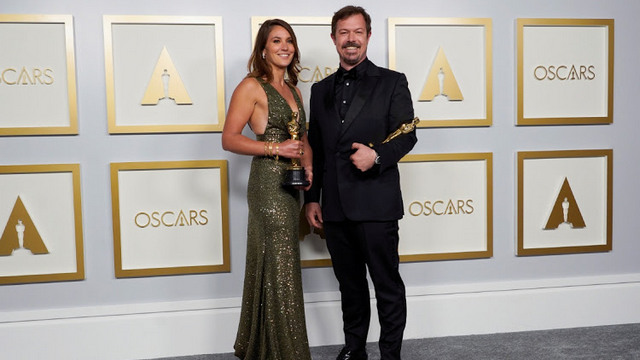
The SA Netflix documentary My Octopus Teacher won the Oscar for Best Documentary Film feature early on Monday morning.
The film — which has won more than 20 international awards, including Best Documentary at the British Academy Film Awards and Producers Guild of America Awards — becomes the first nature documentary to win an Academy Award since The Cove in 2010.
Co-director and Rhodes University Journalism and Media Studies alumnus Pippa Ehrlich, who accepted the iconic gold statuette at the awards ceremony in Los Angeles with co-director James Reed, said she is “utterly overwhelmed” with “an honour we never dreamed possible”.
“In many ways this is a tiny personal story that played out in sea forest at the very tip of Africa, but on a more universal level I hope it provided a glimpse of a different type of relationship between human beings and the natural world.”
In a personal letter sent before the ceremony, President Cyril Ramaphosa congratulated the production team of the film, saying it was “documentary storytelling at its best, with a deeply resonant conservation message”.
My Octopus Teacher does not use disturbing images of the degradation of the ocean and its creatures but gently lures the audience into a deep sense of wonder and compassion for the magical and biodiverse world of the Great African Sea Forest, where underwater tracker Craig Foster builds a profound relationship with a common octopus while diving near his home in False Bay.
The film became the first SA documentary last year to become a Netflix Original. It was released to instant acclaim during the global Covid-19 lockdown, which Ehrlich acknowledges as partly serendipitous to the film’s stellar rise in popularity.
“In a difficult year, when many of us were stuck inside, feeling afraid and confused, a positive story that transports you to a magical world has a powerful appeal. Parts of this story are universal to almost every person on Earth — love and friendship, and connection and hope,” Ehrlich said.
“It’s about nature, but it’s also a very powerful, archetypal story that helps us make sense of the world.”
Foster, a documentary filmmaker for 28 years, said the Oscar victory brings life-affirming kudos to the media advocacy work by the film’s producing entity the Sea Change Project, which he co-founded with My Octopus Teacher associate producer Ross Frylinck in 2012.
“The Academy Award elevates the Great African Sea Forest and surrounding ocean of SA into global iconic status. This is excellent news for us because it underlines what we have been aiming for: to show the world we are sitting on a biodiversity treasure trove that is deeply worthy of protection.”
Foster said the most exciting aspect for their organisation has been the feedback received.
“We have received thousands of messages from people around the world. Many have started diving, studying marine sciences or using My Octopus Teacher as a tool in mental health workshops and in discussions around emotional ecology and deep nature connection. We wanted to showcase this wonderful ecosystem, the Great African Sea Forest, to the world, and we have succeeded,” he said.
In the film, Foster uses animal-tracking techniques he learnt when documenting the Bushmen of the Kalahari Desert for The Great Dance: A Hunter’s Story (2000) and My Hunter’s Heart (2010).
TimesLIVE.
